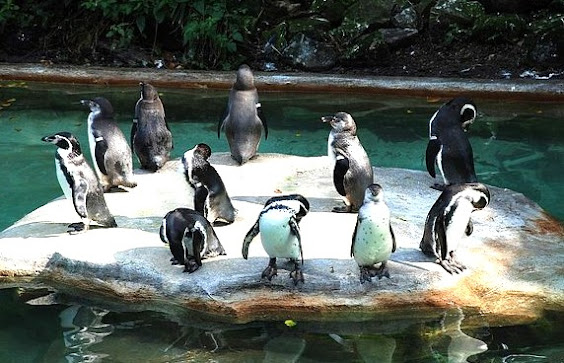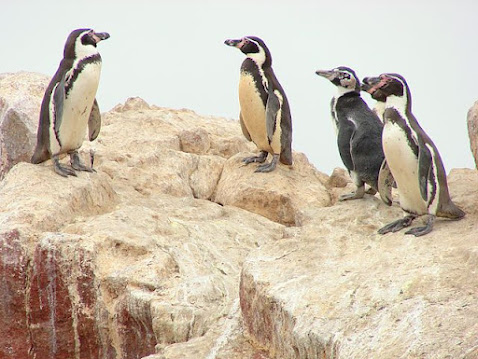Flop the baby penguin
Humboldt penguins at Dudley Zoo, EnglandAmidst all the doom, gloom, and misery there are occasionally moments of pure joy. Flop is a Humboldt penguin (Spheniscus humboldti) and was hatched at Dudley Zoo last April, but her mother died, and her father virtually abandoned her.
Her keepers moved her into an isolation area so that they could hand rear her. Unfortunately, Flop developed a limp and soon, despite pain relief and medication to reduce inflammation, she could not stand at all. Blood tests showed that she had an infection and further medication was prescribed. Sadly, the little bird became withdrawn and lost interest in food.
Penguins are accustomed to ingesting large amounts of food at a time, but when Flop was lying on her front, this was probably quite uncomfortable for her.
Staff were increasingly concerned that she would not survive, until someone suggested that a custom-made baby bouncer might help. It would keep her upright and allow her to eat, so that antibiotics could be delivered. Her keepers also devised a type of baby walker treadmill for her. They also gave her many more small feeds during the day, ending with a ten o’clock feed at night. It was important that she didn’t lose too much weight. Chicks raised by their parents feed only once a day.
In the mornings, Flop would be put into her baby bouncer for feeding. Her feet just touched the floor, the objective being to accustom her to being upright and encourage her to use her feet. She was left in the bouncer under supervision, while the other young birds being hand-reared were fed.
After much tweaking of the baby walker, Flop started to put on weight and was also allowed to have short, supervised swims. Her confidence grew and soon she was able to stand unaided and start walking.
An animal physiotherapist gave the keepers exercises to do with Flop to build up her strength and soon she was able to spend time with the other youngsters in the isolation area. She will eventually rejoin the main colony. It is likely that she will always be smaller and lighter than her peers, but she has made wonderful progress.
Humboldt penguins, Islas Ballestas, PeruHumboldt penguins live in South America and are considered a vulnerable species, their population decreasing. One threat lies in the changes to sea surface temperature, which means that Humboldt penguins travel further south and spend more time and energy hunting anchovy and other shoaling fish. They are affected by commercial overfishing and are often entangled in fishing nets.
Of all the penguin species, Humboldt penguins are the shyest and most affected by the presence of humans. It takes penguins up to half an hour for their heartrate to return to normal after approaches by human beings. The stress caused by frequent human visits leads to delay in hunting partners returning and to desertion of nests, ultimately resulting in decreased breeding and a subsequent fall in numbers. About half the pairs produce two chicks at each mating and can breed twice a year.
Feral animals, like goats, dogs and cats also play their part in the decline of the penguins. Goats eat the vegetation the penguins use for their nests, and rats eat the eggs.
Zoos across the world are the reserves for vulnerable species. It may seem wrong to limit such animals to small areas, but if they can be bred there and saved from extinction and possibly numbers released into the wild at some point, it is surely worthwhile to do so.


What a lovely story about Flop! Hope she continues to thrive
ReplyDeleteI hope so, too, after all the effort from her keepers.
DeleteI am so glad Flop survived. I agree it is worthwhile to try breeding programs in Zoos and in the wild I think there should be bans in certain areas, so people can't get too close and upset the birds or whatever animals are becoming extinct because the humans frighten them.
ReplyDeleteI agree. Humans think they should be allowed to trample wherever they wish. I feel very strongly that cruise ships should not be travelling Antarctic seas and other precious and vulnerable areas.
DeleteA heartwarming story plus excellent information. I recall seeing a documentary about Emperor penguins at the theatre some years ago, when I say ‘some’ it is probably 15 years.
ReplyDeleteI think I saw it, or something very similar.
DeleteI found it: March of the Penguins was the movie, and it was 19 years ago. Here’s what I said then.
ReplyDeleteIt was a wonderful film. If you haven't seen it, I heartily recommend that you consider amending that situation toute de suite. It shows nature at its unusual and astounding finest. The Emperor Penguins walk (yes, walk) seventy miles to mate and hatch their eggs and tend to the chicks. The males go without food for four months, standing together with their chicks tucked under them but on top of their feet through the perishing Antarctic winter. Both the females and the males make the seventy mile trip more than once. They waddle and slide non-stop for a whole week on each of these trips. It's effing amazing. Go see it!
It is quite astonishing that these animals overcome such obstacles to mate and raise their young. It gives a whole new meaning to 'survival of the fittest.'
DeleteQuite a heartwarming story about Flop.
ReplyDeleteIt cheered me up considerably.
DeleteSuch a good story about Humboldt penguins
ReplyDeleteIt's heartwarming, isn't it?
DeleteWe always see the Little Penguins on Phillip island, who trek up from the ocean each night together
ReplyDeleteBut your Humboldt Penguins are much taller and heavier, and look more capable of looking after themselves. I hope they can.
How privileged you are to see penguins regularly. I'd love to see them in the flesh.
DeleteAh, such a sweet story. I am so glad they took such steps to save little Flop.
ReplyDeleteSo am I. Such a little life, but worth saving.
DeleteA great tale of a single penguin. Yes, amid the doom and gloom but how good is it that you live in a country that can devote resources to rehabilitating a sole penguin.
ReplyDeleteIt is a first world problem and fades into insignificance when set against the greater human tragedies in the world today.
Deleteoh what a beautiful story, I'm so glad those dedicated keepers didn't give up on little Flop. I didn't like zoos and would never visit them because I couldn't bear to see beautiful animals in captivity, but nowadays they are a necessity and keepers are more aware of trying to mimic their natural environment.
ReplyDeleteI don't care for zoos but understand their role in conservation. They are almost museums of natural history in some instances.
DeleteA heartwarming story about little Flop. If only we could demonstrate that same level of concern about one another as well as the welfare of animals in general.
ReplyDeleteI agree. It's a salutary lesson in compassion.
DeleteZookeepers do amazing work in rehabbing animals don't they. This is an amazing story and I'm grateful to hear that the bird has survived to this point. I wish her a very long life.
ReplyDeleteI wonder if there will be a follow up at some point, 'Flop's First Egg,' for example.
DeleteWell, this gave me my first smile of the day! Great news for Flop and the people at the zoo for never giving up!
ReplyDeleteThe keepers become very invested in their animals, and so it should be.
DeleteLovely story and educational.
ReplyDeleteI thought it was lovely, too.
DeleteFlop's story touched my heart and made tears fill my eyes. It's true it really did. I so admire people who chose to care for animals.
ReplyDeleteSuch stories never fail to tug at the heartstrings.
DeleteRemarkable story about Flop. I love the zookeepers' ingenuity.
ReplyDeleteImagination and determination together worked in the little bird's favour.
Deletesuch an interesting and touching story. I saw penguins once at Sea World and boy did they stink!! But were very cute...
ReplyDeleteYes, they don't smell as lovely as they look!
DeleteI've read about Flop on Facebook, if I remember correctly. Isn't it a heartwarming story? xxx
ReplyDeleteIt restores one's faith in human nature.
DeleteThat's a great story. Glad to hear she is well.
ReplyDeleteIt's a cheering tale, isn't it?
DeleteAww lovely.
ReplyDeleteI hope she continues to thrive.
All the best Jan
So do I. 😀
DeleteHow heartening to learn that people are prepared to put so much care and consideration into one small creature. It is a lovely counterbalance to all our desperate news.
ReplyDeleteIt is a reminder that people can be nice and often are.
DeleteSorry, the above comment is mine - I forgot to check.
ReplyDelete🐧
DeleteI know what Humboldt penguins feel like as they wait for their heart rate to return to normal after approaches by human beings. That's what happens to me whenever I see a picture of Cameron Diaz. Good news about Flop and thanks for sharing it!
ReplyDeleteYorkshire Penguin? 🐧
ReplyDelete